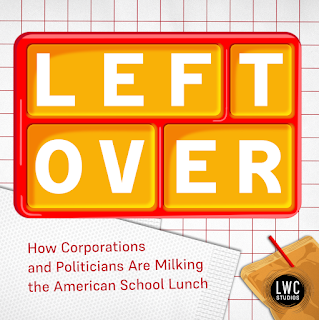When I read in the Podnews newsletter one morning months ago that a new investigative podcast was about to be released about the school lunch program and the school cafeteria, I was skeptical. What "smoking guns" could be uncovered? The peanut butter isn't organic. The cheese pizza doesn't actually have any real cheese. High school students prefer Doritos to grapes and apple slices.
I was so wrong. Left Over is an utterly fascinating, illuminating, and disturbing investigative podcast. The investigator and host Jessica Terrell is terrific; maybe even tremendous. And most definitely tenacious.
Here is the mission statement of the podcast: "Left Over is a six-part investigative series from LWC Studios looking at the systemic shortcomings of the National School Lunch Program, from those at the bottom of the food pyramid to those at the top. Left Over’s reporter, award-winning journalist Jessica Terrell, travels to school districts across the country for a closer look at why and how corporations and politicians are undermining and exploiting the American public school lunch system. Each episode of Left Over dives into the experiences of lunch workers, students, families, caretakers, and community organizers while examining how the problematic views surrounding poverty and unchecked racial inequality are fueling the country’s largest anti-hunger programs."
What I learned after the six episodes is despite posturing by addle-headed politicians anxious to score with their base, the National School Lunch Program has a complex, interwoven, and Byzantine web of problems. There is no simple solution.
First, we learn that there are indeed too many cooks in the kitchen. Politicians realized they could score political points by using the program as a cultural punching bag when then First Lady Michelle Obama tried to raise the level of nutrition in the program. Since then, mostly Republican elected officials attack the program for reasons that range from the food is too woke (That is a real criticism) to the "deep state" is somehow manipulating the food students eat for a yet unknown purpose.
Parents, now energized by chasing down CRT boogeymen and "groomers," wade into the school lunch morass with either good yet misguided intentions or simply to flex their parental rights' muscles.
"The federal government can't tell my son he can't eat Cheetos." It's that kind of oppositional disordered behavior.
Corporate food giants like Aramark, Sodexho, and Chartwells have come bearing gifts to strapped school district budgets, offering lower food costs and better food nutrition. Sadly, according to Terrell, their promises appear to be as empty as the calories in their food.
In the six-episode podcast, Terrell, builds her case carefully like a complex Lego set. She reminds listeners that the school lunch program suffers from too many cooks in the kitchen. Parents have an agenda that can range from ensuring their children eat healthy to advancing a political platform with their children as pawns. Students have an agenda, often limited to consuming food that tastes good, even if it's not good for you. Teachers, school cafeteria workers, and school administrators attempt to please multiple stakeholders -- from parents to the federal government and from students to pesky elected officials -- and often anger everyone.
Terrell begins the series with an episode called "It's Blame the Lunch Worker First and Foremost." These front-line food workers are often in the cannon sights of constituencies ranging from parents to politicians.
Then Terrell gives listeners a history lesson of government food assistance, and how these programs have been afflicted by racism, classism, and political interference. It's not a comforting story.
Next, the trend from scratch-cooked meals in school kitchens to highly processed foods is examined, and how cost-cutting figures into that unfortunate decision.
For those who believe that privatization is the answer to every social problem, the next episode should emphatically make them reconsider that closely held belief. The three food giants talk a great game about saving money for school districts, however, the reality is pockmarked with cost overruns, inferior food quality, and, of course, increasing profits and raising share prices.
In the penultimate episode, Terrell pries open a door to a world of no-win choices. When nutritionists, parents, doctors, and cafeteria administrators question the efficacy and health of distributing so much chocolate milk (about 70 percent of all milk used in the program), they run squarely into resistance from dairy companies and the Republican Congresswoman from New York's 21st District, Elise Stefanik, because culling chocolate milk from the program would affect Stefanik's constituents, who are dairy farmers. Again, business wins, and voters lose.
The final episode takes us from the darkness of competing interests, political influence peddling, corporate greed, parental over zealousness, and governmental bureaucracy to admirable examples of some school districts and food service administrators that still discover windows of opportunity for innovation.
Solutions include sustainable lunch menus, farm-to-table distribution, culturally relevant menus, and innovative lunch menus.
Left Over is a tour de force of investigative reporting. For reasons ranging from the hollowed-out local newspaper infrastructure to a rush to the more visible true-crime reporting, investigative journalism is an art form now reserved for high-powered and big-dollar documentaries.
Protecting the "little guy" via investigative journalism has now morphed into another corporate virtue-signaling exercise in too many cases.
Jessica Terrell, the host of Left Over, covers the multitude of issues surrounding the school lunch program with such objectivity, controlled outrage, and attention to detail that she'll have many listeners eating out of her hand.

Comments
Post a Comment
Thank You for your input and feedback. If you requested a response, we will do so as soon as possible.